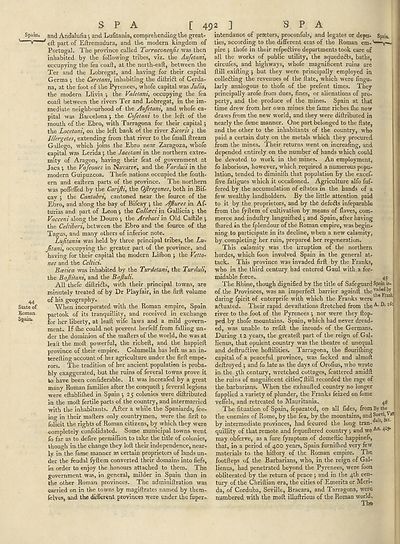Encyclopaedia Britannica, or, a Dictionary of arts, sciences, and miscellaneous literature : enlarged and improved. Illustrated with nearly six hundred engravings > Volume 19, Scripture-SUG
(540) Page 492
Download files
Complete book:
Individual page:
Thumbnail gallery: Grid view | List view

SPA [ 492 j SPA
Spain. and An Jaluiia 5 and Lufitania, comprehending the great-
eft parf 0f Eftremadura, and the modern kingdom of
Portugal. The province called Tarraconenfis was then
inhabited by the following tribes, viz. the Aufetani,
occupying the fea coaft, at the north-eaft, between the
Ter and the Lobregat, and having for their capital
Germa ; the Ceretani, inhabiting the dittridt of Cerda-
na, at the foot of the Pyrenees, whofe capital was Juliay
the modern Llivia ■, the Va/etani, occupying the fea
coaft between the rivers Ter and Lobregat, in the im¬
mediate neighbourhood of the Aufetaniy and whofe ca¬
pital was Barcelona j the Cofetani to the left of the
mouth of the Ebro, with Tarragona for their capital j
the Locetani, on the left bank of the river Sicoris ; the
Jllergetes, extending from that river to the fmall ftream
Gallego, which joins the Ebro near Zaragoza, whofe
capital was Lerida j the Jacetani in the northern extre¬
mity of Aragon, having their feat of government at
Jaca *, the Vafcones in Navarre, and the Varduii in the
modern Guipuzcoa. Thefe nations occupied the fouth-
ern and eaftern parts of the province. The northern
was poffefled by the Carijfi, the OJlregones, both in Bif-
cav j the Cantabri, cantoned near the fource of the
Ebro, and along the bay of Bifcay ; the Afiures in Af-
turias and part of Leon j the Calhxci in Gallicia 5 the
Vacceni along the Douro *, the Arebact in Old Caftile *,
the Celtiberi, between the Ebro and the fource of the
Tagus, and many others of inferior note.
Lufitania was held by three principal tribes, the Lu-
Jitani, occupying the greater part of the province, and
having for their capital the modern Lifbon j the Vetto-
nes and the Ccltict.
Btetica was inhabited by the Turdetani, the Turduli,
the Baftitani, and the Bajluli.
All thefe did riels, with their principal towns, are
minutely treated of by Dr Playfair, in the firfl volume
44 of his geography.
State of When incorporated with the Roman empire, Spain
Soman partook of its tranquillity, and received in exchange
3jain. for iier liberty, at lead wife laws and a mild govern¬
ment. If die could not prevent herfelf from falling un¬
der the dominion of the maders of the world, die was at
lead the mod powerful, the riched, and the happied
province of their empire. Columella has left us an in-
tereding account of her agriculture under the fird empe¬
rors. The tradition of her ancient population is proba¬
bly exaggerated, but the ruins of feveral towns prove it
to have been confiderable. It was increafed by a great
many Roman families after the conqued \ feveral legions
were edablidied in Spain *, 25 colonies were didributed
in the mod fertile parts of the country, and intermarried
with the inhabitants. After a while the Spaniards, fee¬
ing in their maders only countrymen, were the fird to
folicit the rights of Roman citizens, by which they were
completely confolidated. Some municipal towns went
fo far as to defire permidion to take the title of colonies,
though in the change they lod their independence, near¬
ly in the fame manner as certain proprietors of lands un¬
der the feudal fydem converted their domains into fiefs,
in order to enjoy the honours attached to them. The
government was, in general, milder in Spain than in
the other Roman provinces. The adminidration was
carried on in the towns by magidrates named by them-
felves, and the different provinces were under the fuper-
intendance of praetors, proconfuls, and legates or depu- Spain,
ties, according to the different eras of the Roman em-
pire \ thofe in their refpeftive departments took care of
all the works of public utility, the aquedu&s, baths,
circufes, and highways, whofe magnificent ruins are
dill exiding 5 but they were principally employed in
colledling the revenues of the date, which were fingu-
larly analogous to thofe of the prefent times. They
principally arofe from dues, fines, or alienations of pro¬
perty, and the produce of the mines. Spain at that
time drew from her own mines the fame riches die now
draws from the new world, and they were didributed in
nearly the fame manner. One part belonged to the date,
and the other to the inhabitants of the country, who
paid a certain duty on the metals which they procured
from the mines. Their returns went on increafing, and
depended entirely on the number of hands which could
be devoted to work in the mines. An employment,
fo laborious, however, which required a numerous popu¬
lation, tended to diminidi that population By the excef-
five fatigues which it occafioned. Agriculture alfo dif¬
fered by the accumulation of edates in the hands of a
few wealthy landholders. By the little attention paid
to it by the proprietors, and by the defe£ls infeparable
from the fydem of cultivation by means of flaves, com¬
merce and indudry languidied ; and Spain, after having
diared in the fplendour of the Roman empire, was begin¬
ning to participate in its decline, when a new calamity,
by completing her ruin, prepared her regeneration.
This calamity was the irruption of the northern
hordes, which foon involved Spain in the general at¬
tack. This province was invaded fird by the Franks,
who in the third century had entered Gaul with, a for¬
midable force.
The Rhine, though dignified by the title of Safeguard Spain in-
of the Provinces, was an imperfect barrier againd the^^jU
daring fpirit of enterprife with which the Franks were
a6luated. Their rapid devadations dretched from theA-®,lS;
river to the foot of the Pyrenees *, nor were they dop-
ped by thofe mountains. Spain, which had never dread¬
ed, was unable to refid the inroads of the Germans.
During 12 years, the greated part of the reign of Gal-
lienus, that opulent country was the theatre of unequal
and dedruftive hodilities. Tarragona, the flouridling
capital of a peaceful province, was facked and almofl
dedroyed ; and fo late as the days of Orofius, who wrote
in the 5th century, wretched cottages, fcattered amidfl
the ruins of magnificent cities^dill recorded the rage of
the barbarians. When the exhauded country no longer
fupplied a variety of plunder, the Franks feized on feme
veffels, and retreated to Mauritania. 4$
The fituation of Spain, feparated, on all fides, from By the ^
the enemies of Rome, by the fea, by the mountains,
by intermediate provinces, had fecured the long tran- a ’
quillity of that remote and fequedered country ; and we An’ 4^
may obferve, as a fure fymptom of domedic happinefs,
that, in a period of 400 years, Spain furnidied very few
materials to the hidory of the Roman empire. The
footdeps of the Barbarians, who, in the reign of Gal-
lienus, had penetrated beyond the Pyrenees, were feon
obliterated by the return of peace ; and in the 4th cen¬
tury of the Chridian era, the cities of Emerita or Meri¬
da, of Corduba, Seville, Bracara, and Tarragona, were
numbered with the mod illudrious of the Roman world.
Spain. and An Jaluiia 5 and Lufitania, comprehending the great-
eft parf 0f Eftremadura, and the modern kingdom of
Portugal. The province called Tarraconenfis was then
inhabited by the following tribes, viz. the Aufetani,
occupying the fea coaft, at the north-eaft, between the
Ter and the Lobregat, and having for their capital
Germa ; the Ceretani, inhabiting the dittridt of Cerda-
na, at the foot of the Pyrenees, whofe capital was Juliay
the modern Llivia ■, the Va/etani, occupying the fea
coaft between the rivers Ter and Lobregat, in the im¬
mediate neighbourhood of the Aufetaniy and whofe ca¬
pital was Barcelona j the Cofetani to the left of the
mouth of the Ebro, with Tarragona for their capital j
the Locetani, on the left bank of the river Sicoris ; the
Jllergetes, extending from that river to the fmall ftream
Gallego, which joins the Ebro near Zaragoza, whofe
capital was Lerida j the Jacetani in the northern extre¬
mity of Aragon, having their feat of government at
Jaca *, the Vafcones in Navarre, and the Varduii in the
modern Guipuzcoa. Thefe nations occupied the fouth-
ern and eaftern parts of the province. The northern
was poffefled by the Carijfi, the OJlregones, both in Bif-
cav j the Cantabri, cantoned near the fource of the
Ebro, and along the bay of Bifcay ; the Afiures in Af-
turias and part of Leon j the Calhxci in Gallicia 5 the
Vacceni along the Douro *, the Arebact in Old Caftile *,
the Celtiberi, between the Ebro and the fource of the
Tagus, and many others of inferior note.
Lufitania was held by three principal tribes, the Lu-
Jitani, occupying the greater part of the province, and
having for their capital the modern Lifbon j the Vetto-
nes and the Ccltict.
Btetica was inhabited by the Turdetani, the Turduli,
the Baftitani, and the Bajluli.
All thefe did riels, with their principal towns, are
minutely treated of by Dr Playfair, in the firfl volume
44 of his geography.
State of When incorporated with the Roman empire, Spain
Soman partook of its tranquillity, and received in exchange
3jain. for iier liberty, at lead wife laws and a mild govern¬
ment. If die could not prevent herfelf from falling un¬
der the dominion of the maders of the world, die was at
lead the mod powerful, the riched, and the happied
province of their empire. Columella has left us an in-
tereding account of her agriculture under the fird empe¬
rors. The tradition of her ancient population is proba¬
bly exaggerated, but the ruins of feveral towns prove it
to have been confiderable. It was increafed by a great
many Roman families after the conqued \ feveral legions
were edablidied in Spain *, 25 colonies were didributed
in the mod fertile parts of the country, and intermarried
with the inhabitants. After a while the Spaniards, fee¬
ing in their maders only countrymen, were the fird to
folicit the rights of Roman citizens, by which they were
completely confolidated. Some municipal towns went
fo far as to defire permidion to take the title of colonies,
though in the change they lod their independence, near¬
ly in the fame manner as certain proprietors of lands un¬
der the feudal fydem converted their domains into fiefs,
in order to enjoy the honours attached to them. The
government was, in general, milder in Spain than in
the other Roman provinces. The adminidration was
carried on in the towns by magidrates named by them-
felves, and the different provinces were under the fuper-
intendance of praetors, proconfuls, and legates or depu- Spain,
ties, according to the different eras of the Roman em-
pire \ thofe in their refpeftive departments took care of
all the works of public utility, the aquedu&s, baths,
circufes, and highways, whofe magnificent ruins are
dill exiding 5 but they were principally employed in
colledling the revenues of the date, which were fingu-
larly analogous to thofe of the prefent times. They
principally arofe from dues, fines, or alienations of pro¬
perty, and the produce of the mines. Spain at that
time drew from her own mines the fame riches die now
draws from the new world, and they were didributed in
nearly the fame manner. One part belonged to the date,
and the other to the inhabitants of the country, who
paid a certain duty on the metals which they procured
from the mines. Their returns went on increafing, and
depended entirely on the number of hands which could
be devoted to work in the mines. An employment,
fo laborious, however, which required a numerous popu¬
lation, tended to diminidi that population By the excef-
five fatigues which it occafioned. Agriculture alfo dif¬
fered by the accumulation of edates in the hands of a
few wealthy landholders. By the little attention paid
to it by the proprietors, and by the defe£ls infeparable
from the fydem of cultivation by means of flaves, com¬
merce and indudry languidied ; and Spain, after having
diared in the fplendour of the Roman empire, was begin¬
ning to participate in its decline, when a new calamity,
by completing her ruin, prepared her regeneration.
This calamity was the irruption of the northern
hordes, which foon involved Spain in the general at¬
tack. This province was invaded fird by the Franks,
who in the third century had entered Gaul with, a for¬
midable force.
The Rhine, though dignified by the title of Safeguard Spain in-
of the Provinces, was an imperfect barrier againd the^^jU
daring fpirit of enterprife with which the Franks were
a6luated. Their rapid devadations dretched from theA-®,lS;
river to the foot of the Pyrenees *, nor were they dop-
ped by thofe mountains. Spain, which had never dread¬
ed, was unable to refid the inroads of the Germans.
During 12 years, the greated part of the reign of Gal-
lienus, that opulent country was the theatre of unequal
and dedruftive hodilities. Tarragona, the flouridling
capital of a peaceful province, was facked and almofl
dedroyed ; and fo late as the days of Orofius, who wrote
in the 5th century, wretched cottages, fcattered amidfl
the ruins of magnificent cities^dill recorded the rage of
the barbarians. When the exhauded country no longer
fupplied a variety of plunder, the Franks feized on feme
veffels, and retreated to Mauritania. 4$
The fituation of Spain, feparated, on all fides, from By the ^
the enemies of Rome, by the fea, by the mountains,
by intermediate provinces, had fecured the long tran- a ’
quillity of that remote and fequedered country ; and we An’ 4^
may obferve, as a fure fymptom of domedic happinefs,
that, in a period of 400 years, Spain furnidied very few
materials to the hidory of the Roman empire. The
footdeps of the Barbarians, who, in the reign of Gal-
lienus, had penetrated beyond the Pyrenees, were feon
obliterated by the return of peace ; and in the 4th cen¬
tury of the Chridian era, the cities of Emerita or Meri¬
da, of Corduba, Seville, Bracara, and Tarragona, were
numbered with the mod illudrious of the Roman world.
Set display mode to:
![]() Universal Viewer |
Universal Viewer | ![]() Mirador |
Large image | Transcription
Mirador |
Large image | Transcription
Images and transcriptions on this page, including medium image downloads, may be used under the Creative Commons Attribution 4.0 International Licence unless otherwise stated. ![]()
| Permanent URL | https://digital.nls.uk/192702302 |
|---|
| Attribution and copyright: |
|
|---|
| Description | Ten editions of 'Encyclopaedia Britannica', issued from 1768-1903, in 231 volumes. Originally issued in 100 weekly parts (3 volumes) between 1768 and 1771 by publishers: Colin Macfarquhar and Andrew Bell (Edinburgh); editor: William Smellie: engraver: Andrew Bell. Expanded editions in the 19th century featured more volumes and contributions from leading experts in their fields. Managed and published in Edinburgh up to the 9th edition (25 volumes, from 1875-1889); the 10th edition (1902-1903) re-issued the 9th edition, with 11 supplementary volumes. |
|---|---|
| Additional NLS resources: |
|

